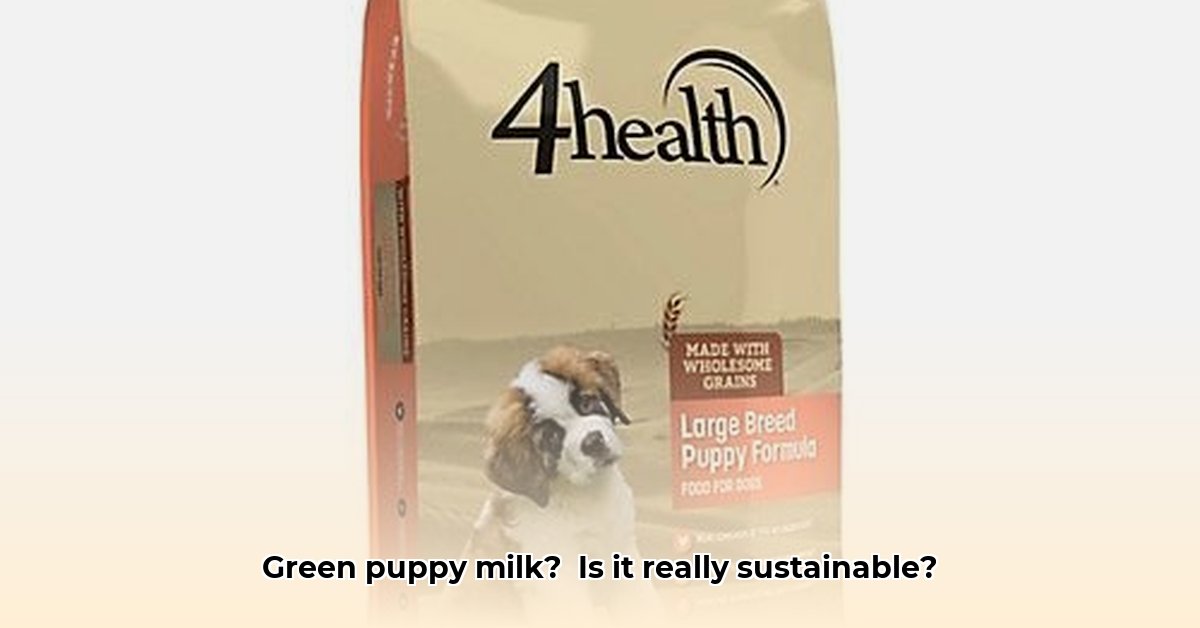
Choosing the right puppy milk replacer is crucial for your puppy's health, but its environmental impact shouldn't be overlooked. This guide provides actionable steps to select and use puppy formula sustainably, whether you buy from Tractor Supply or make your own. For kitten wormer options, check out Tractor Supply.
Understanding the Environmental Footprint of Puppy Milk Replacers
The production of puppy milk replacer, from ingredient sourcing to packaging, leaves a carbon footprint. Transportation of ingredients, manufacturing processes, and packaging waste all contribute to environmental concerns. By making informed choices, you can significantly reduce this impact. Did you know that the transportation of ingredients alone can account for up to 20% of a product's overall carbon footprint?
Selecting Sustainable Ingredients: The Source Matters
Ingredient sourcing is paramount. Prioritize locally sourced ingredients to reduce transportation emissions. "Locally sourced ingredients significantly reduce the carbon footprint associated with transportation," explains Dr. Evelyn Reed, Veterinarian and Sustainability Expert at the Green Paws Institute. Look for milk proteins from farms using ethical and sustainable practices—responsible land management, minimal antibiotic and pesticide use. Emerging plant-based or insect-based protein options offer potentially more sustainable alternatives, though research into their optimal use is ongoing.
Minimizing Packaging Waste: Think Before You Buy
Packaging significantly impacts the environment. Choose puppy milk replacer in minimal packaging or packaging made from recycled and recyclable materials. Buying in bulk, where possible, reduces packaging waste per serving. "Switching to brands utilizing cardboard instead of plastic can make a surprisingly large difference," notes Sarah Miller, Environmental Consultant at EcoPet Solutions. Remember the 3 R's: Reduce, Reuse, Recycle!
Choosing Responsible Manufacturers: Transparency is Key
Prioritize manufacturers committed to transparent and sustainable practices. Look for brands that openly share their sustainability initiatives and certifications. A company's willingness to be transparent about its environmental efforts reflects its commitment to responsible production.
Your Sustainable Shopping Checklist: A Quick Guide
Use this checklist when purchasing puppy milk replacer:
- Ingredient Origin: Are ingredients locally sourced and produced sustainably?
- Packaging Type: Is the packaging minimal, recyclable, and made from recycled materials?
- Manufacturer's Commitment: Does the manufacturer actively promote and document its sustainability efforts?
- Protein Source Innovation: Does the product utilize innovative and sustainable protein sources?
Weighing the Pros and Cons: Different Routes, Different Impacts
Consider the following when making your decision:
| Approach | Pros | Cons |
|---|---|---|
| Locally Sourced Dairy | Supports local farmers, reduces transportation emissions, potentially higher quality | Might be more expensive, limited availability, seasonal variations in supply |
| Plant-Based Protein | Generally lower environmental impact, often readily available | May require additional ingredients for complete nutrition, consumer acceptance still developing |
| Insect-Based Protein | Extremely efficient protein source, exceptionally low environmental impact | Requires more research for optimal usage in puppy milk replacer, growing consumer awareness |
How to Make Puppy Milk Replacer Sustainably: Homemade vs. Commercial
Choosing between homemade and commercial puppy milk replacer presents a trade-off between convenience and nutritional consistency.
Understanding Your Options: Homemade vs. Commercial
Commercial options are convenient and nutritionally balanced, undergoing strict quality control. However, their packaging and transportation contribute to their environmental impact. Homemade options are potentially more eco-friendly, but maintaining a consistent nutritional balance and preventing bacterial contamination require expertise and meticulous attention to hygiene.
Crafting a Sustainable Homemade Recipe (Proceed with Extreme Caution!)
Making homemade puppy milk replacer requires expert knowledge. Incorrect preparation can lead to serious health problems for your puppy. Always consult a veterinarian for an approved recipe before attempting. Never attempt this without professional guidance.
Pros and Cons of Homemade vs. Commercial Puppy Milk Replacers
| Feature | Homemade | Commercial |
|---|---|---|
| Cost | Potentially lower | Generally higher |
| Nutritional Consistency | Less consistent; risk of deficiencies | Highly consistent, formulated for optimal puppy growth |
| Convenience | Requires significant time, effort, and precise ingredient sourcing/prep | Ready-to-use, immediately available |
| Environmental Impact | Potentially lower (depends on ingredient sourcing and waste management) | Higher (due to packaging, transportation, and manufacturing processes) |
| Safety | Extremely high risk of bacterial contamination if not prepared correctly | Lower risk due to stringent manufacturing controls and sterilization |
Remember, a healthy puppy is a happy puppy. Prioritize your puppy's nutritional needs. While a sustainable approach is valuable, it should never compromise your puppy's health. Always consult your veterinarian.